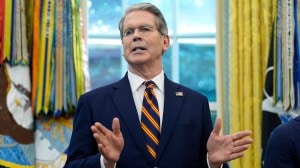POTA fact: Jharkhand has a lot more terror than J-K
March 26, 2002: Deputy Prime Minister L K Advani pushes for the enactment of POTO (Prevention of Terrorism Ordinance), assures the joint ses...

March 26, 2002: Deputy Prime Minister L K Advani pushes for the enactment of POTO (Prevention of Terrorism Ordinance), assures the joint session of Parliament that ‘‘POTO will not be misused because the lacunae contained in TADA are not there in POTO.’’
March 13, 2003: Advani informs the Lok Sabha that the Government has set up a review committee to check misuse of POTA. Says ‘‘the matter is serious enough’’ to warrant a review panel.
Exactly a year after it became law, muzzling all opposition, POTA (Prevention of Terrorism Act) is a hated word. Meant to combat terror, it’s becoming dirtier than predecessor TADA (Terrorist and Disruptive Activities (Prevention) Act) which over 10 years hauled in 77,500 people but tried only 8,000.
POTA today threatens to overtake TADA in terms of notoriety. With law and order being a state subject, state governments are using POTA freely to fix political opponents, openly target communities and detain even minors.
So regularly has Jharkhand invoked POTA that it has beaten Jammu and Kashmir hollow in terms of using the law to combat terror — Jharkhand already has 702 POTA accused while Jammu and Kashmir, grappling with cross-border terrorism, has managed only 168 arrests.
The Home Ministry under Advani maintains it does not have a list of persons arrested under the Act throughout the country because ‘‘implementation of POTA, 2002 is the responsibility of the state governments/UT administrations.’’
A day before Advani made a suo motu statement in the Lok Sabha to announce the setting up of a review committee under Justice Arun Saharya, former Chief Justice of Punjab High Court, to check misuse of POTA, the Home Ministry, responding to a question from Rajya Sabha MP Shahid Siddiqui, admitted they had been ‘‘intimated’’ by the Jharkhand government that ‘‘two cases involving persons aged 17 years and 18 years have been registered under the POTA, 2002.’’
Tamil Nadu too had two juveniles among the 46 arrested under POTA. The Madras High Court intervened in the case of one and the 17-year-old was released a week ago. Slamming the teenager’s detention under POTA, the judge ruled that only the Juvenile Justice (Care and Protection) Act 2000 should have been applied in the case.
And Vaiko will tell you how POTA is being used to settle political scores. The MDMK leader, among the most vocal votaries of POTA when it was being pushed through Parliament, became its first political victim in Tamil Nadu when Chief Minister Jayalalithaa invoked the Act to haul him in. For the record, he was arrested for his pro-LTTE speeches.
And in the north, Uttar Pradesh Chief Minister Mayawati used POTA to good effect to fix Raghuraj Pratap Singh, Kunda’s Raja Bhaiyya who was out to jeopardise her government.
The MLA has been doing the rounds of courts and jails ever since. His plight worried Mayawati critics in the BJP and many spoke openly of POTA misuse.
In Gujarat, where post-Godhra riots saw Muslims being savaged across the state, not once was POTA invoked to nail those responsible. But the Narendra Modi government thought it fit to book 120 people under POTA for torching the Sabarmati Express. In effect, Godhra was terror but not the riots, carnages that followed.
Maharashtra’s Congress-led government veered from the party line and merrily slapped POTA charges against tendu contractors and alleged Naxal sympathisers in Gadchiroli though the state has its own MCOCA, on which POTA was modelled, in place to tackle organised crime.
With 14 POTA accused — number 15 was Mohammed Afroz, accused of being an Al Qaeda link, but the charge was later dropped — Maharashtra entered the new Act league.
Advocate Seema Gulati, who represented the accused in the Parliament House attack case — of the nine POTA cases before the Special Court in Delhi’s Patiala House, it’s the only one to be decided — says one of the reasons for POTA’s open misuse lies in the vagueness of its definition ‘‘whoever conspires, aids, abets, advises or incites or kowingly facilitates… a terrorist act or any act preparatory to a terrorist act…’’
Gulati says ‘any act or thing’ is left to the discretion of the police to term as a terrorist act. Advocate R M Tufail, who’s defending the accused in three POTA cases in Delhi, says: ‘‘It’s purely the discretion of the prosecution to book someone under POTA. It’s, therefore, open to abuse and is being used to settle personal scores.’’
The Centre takes cover under the fact that law and order is a state subject and that the states and UT administrations are responsible for POTA implementation. But clearly, Justice Saharya and his review panel have a task on hand.
Photos



- 01
- 02
- 03
- 04
- 05




























